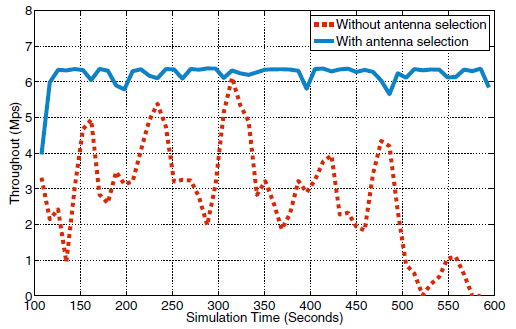TR2008-050
Antenna Selection for Next Generation IEEE 802.16 Mobile Stations
-
- , "Antenna Selection for Next Generation IEEE 802.16 Mobile Stations", IEEE International Conference on Communications (ICC), May 2008, pp. 3457-3462.BibTeX TR2008-050 PDF
- @inproceedings{Nie2008may,
- author = {Nie, C. and Tao, Z. and Mehta, N.B. and Molisch, A.F. and Zhang, J. and Kuze, T. and Panwar, S.},
- title = {{Antenna Selection for Next Generation IEEE 802.16 Mobile Stations}},
- booktitle = {IEEE International Conference on Communications (ICC)},
- year = 2008,
- pages = {3457--3462},
- month = may,
- isbn = {978-1-4244-2075-9},
- url = {https://www.merl.com/publications/TR2008-050}
- }
- , "Antenna Selection for Next Generation IEEE 802.16 Mobile Stations", IEEE International Conference on Communications (ICC), May 2008, pp. 3457-3462.
-
MERL Contact:
-
Research Area:

Abstract:
The IEEE 802.16/WiMAX standard has fully embraced multi-antenna technology and can, thus, deliver robust and high transmission rates and higher system capacity. Nevertheless, due to its inherent form-factor constraints and cost concerns, a WiMAX mobile station (MS) should preferably contain fewer radio frequency (RF) chains than antenna elements. This is because RF chains are often substantially more expensive than antenna elements. Thus, antenna selection, wherein a subset of antennas is dynamically selected to connect to the limited RF chains for transceiving, is a highly appealing performance enhancement technique for multi-antenna WiMAX terminals. In this paper, a novel antenna selection protocol tailored for next-generation IEEE 802.16 mobile stations is proposed. As demonstrated by the extensive OPNET simulations, the proposed protocol delivers a significant performance improvement over conventional 802.16 terminals that lack the antenna selection capability. Moreover, the new protocol leverages the existing signaling methods defined in 802.16, thereby incurring a negligible signaling overhead and requiring only diminutive modifications of the standard. To the best of our knowledge, this paper represents the first effort to support antenna selection capability in IEEE 802.16 mobile stations.
Related News & Events
-
NEWS ICC 2008: 9 publications by Koon Hoo Teo, Zhifeng (Jeffrey) Tao, Philip Orlik, Chunjie Duan, Jinyun Zhang and Zafer Sahinoglu Date: May 19, 2008
Where: IEEE International Conference on Communications (ICC)
MERL Contacts: Philip V. Orlik; Jinyun ZhangBrief- The papers "Narrowband Interference Resilient Receiver Design for Unknown UWB Signal Detection" by Ozdemir, O., Sahinoglu, Z. and Zhang, J., "Localization via TDOA in a UWB Sensor Network using Neural Networks" by Ergut, S., Rao, R.R., Dural, O. and Sahinoglu, Z., "On the Performance of Linear Least-Squares Estimation in Wireless Positioning Systems" by Gezici, S., Guvenc, I. and Sahinoglu, Z., "Best Node Selection through Distributed Fast Variable Power Multiple Access" by Yim, R., Mehta, N.B. and Molisch, A.F., "Antenna Selection for Next Generation IEEE 802.16 Mobile Stations" by Nie, C., Tao, Z., Mehta, N.B., Molisch, A.F., Zhang, J., Kuze, T. and Panwar, S., "Routing in Cooperative Wireless Networks with Mutual-Information Accumulation" by Draper, S.C., Liu, A., Molisch, A.F. and Yedidia, J.S., "A Low-Complexity Synchronization Design for MB-OFDM Ultra-Wideband Systems" by Ye, Z., Duan, C., Orlik, P. and Zhang, J., "A Game-Theoretic Framework for Interference Management through Cognitive Sensing" by Chen, Y., Teo, K.H., Kishore, S. and Zhang, J. and "Inter-Cell Interference Management in WiMAX Downlinks by A Stackelberg Game between BSs" by Chen, Y., Teo, K.H., Kishore, S. and Zhang, J. were presented at the IEEE International Conference on Communications (ICC).
